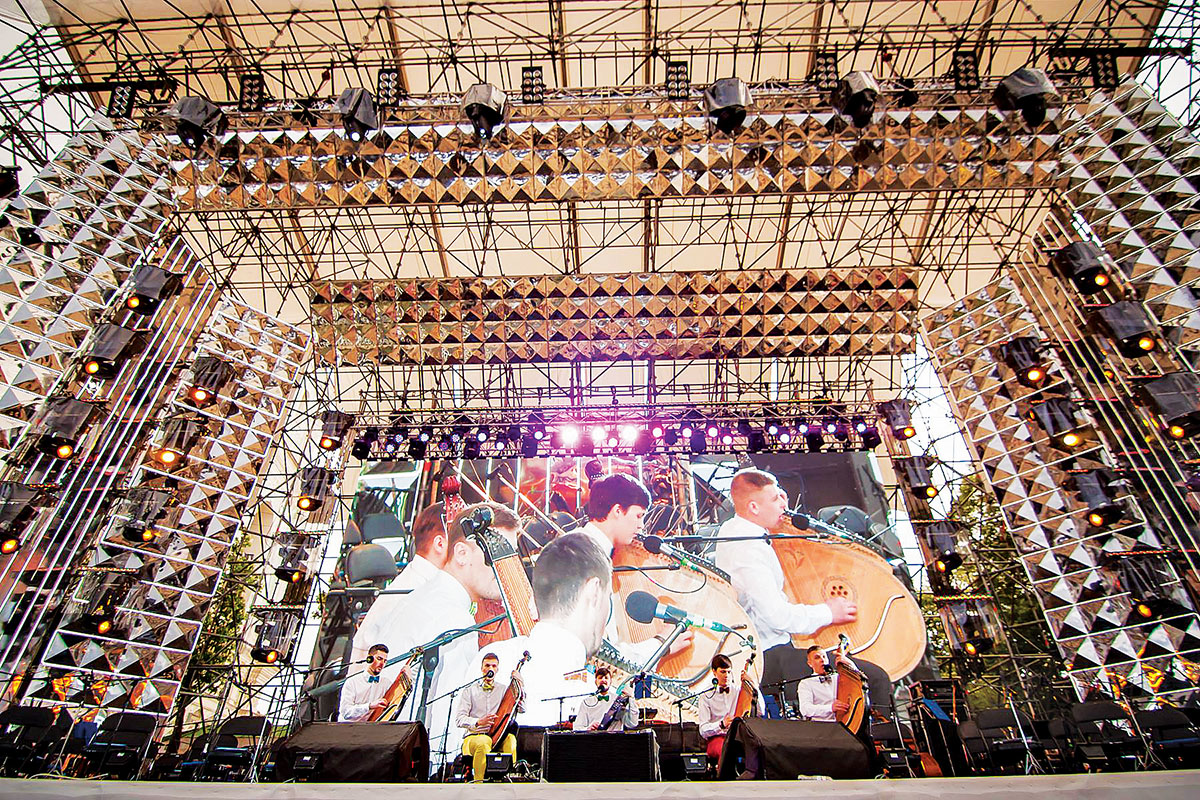Ukrainian folk music has a place in the modern show business. Shpylyasti Kobzari, a Kyiv band playing traditional Ukrainian string instruments, banduras, prove it with each of their shows.
The band says its name “reflects the spirit of their creativity:” Shpylyasti means funny and cheerful, while kobzari were the folk singers who played kobza, a variation of bandura.
Combining folk songs with modern music, Shpylyasti Kobzari promotes Ukrainian culture — among local audience as well as abroad.
“The idea was to make people see that bandura can sound interesting in any genre and style, and show that a modern young person can play music on bandura and it can be impressive and inspiring,” says Yaroslav Dzhus, 30, the band’s founder and leader.
The band’s six members promote the idea that Ukraine’s traditions are trendy through their looks, too: During their shows they wear Ukrainian traditional shirts, vyshyvankas, but pair them with ripped jeans and sneakers.
Shpylyasti Kobzari was founded in 2011 and quickly became famous thanks to the TV show “Ukraine’s Got Talent.” Apart from Ukraine, the band has toured about 20 countries.
The band members became friends in 2006–2009 during their studies at the Stritivka Higher Pedagogical School of Kobzar Art at Stritivka, a village 60 kilometers north of Kyiv. They started experimenting with banduras, playing covers of the world-renowned hits or adapting Ukrainian folk songs to show that bandura can be used for more than folk music.
“We also aimed to make a show that would surprise people, reflecting the idea that anyone can play bandura, not only kobzars,” Dzhus says.

Shpylyasti Kobzari perform during the Christmas holidays at Sofiiska Square in Kyiv in January of 2017. (Courtesy)
Playing in Ukraine and abroad
Shpylyasti Kobzari had their first show abroad in Munich in 2012, one year after the band was founded. During the last year, they had more than 10 performances abroad, mainly for Ukrainian diaspora.
“We mostly play folk music, combined with other genres such as jazz, rock, electro house and hip-hop, famous dance hits, or retro songs,” Dzhus says. “We play at various conferences, meetings, at embassies and consulates.”
Once, the band even tried to influence international politics with their music.
While the Netherlands was preparing to vote in a referendum on whether to ratify Ukraine’s association agreement with the European Union in the spring of 2016, Shpylyasti Kobzari recorded a video appeal to the Dutch people, asking for their support. The band performed the Netherlands’ national anthem in old Dutch.
Oksana Borovets, 32, the band’s art director, says they received lots of positive reactions from the Dutch people on social media.
While abroad Shpylyasti Kobzari plays to promote Ukrainian culture, at home the band plays to promote bandura.
That has become especially vital this year: The school of kobzar art that brought them together is at risk of shutting down due to its unpopularity among students.
The band member Volodymyr Vikarchuk, 27, says that the fact that they make a living from their shows proves that there is a demand for Ukrainian folk music.
According to another band member Yurii Myronets, 26, the audience of the band in Ukraine is really diverse and includes youngsters and children who want to learn bandura, as well as older Ukrainians honoring authentic Ukrainian culture.
“Very often whole families come to our shows,” Myronets says. “Even more often, children bring their parents — but not the other way around.”
The band also often plays in orphanages and schools, and makes charity appearances. During one such show in May of 2017, they played for people with hearing impairments. For this show, each of the band’s members learned a song in a sign language.
Dzhus says the band does not shun the old traditional songs, and try hard to preserve the authenticity of Ukrainian folk music.
“At the same time we experiment with these songs, modernizing them,” he says. “This is what we see the future in.”
The next live performance of Shpylyasti Kobzari will be held at Ostannia Barykada restaurant in Kyiv (1 Maidan Nezalezhnosti St.) on Aug. 31. 8 p.m.
